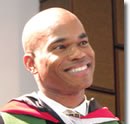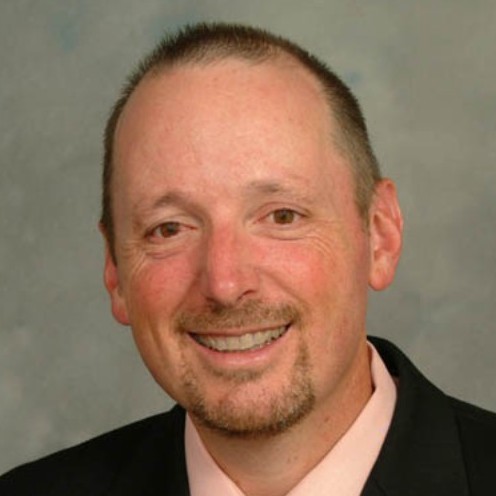By Robert Dilday
Reconciling racial conflicts requires abandoning a “human point of view,” two pastors told a group of Baptists in North Carolina Nov. 4.
The two pastors — one black, the other white — engaged in a “sermon dialogue” during the Cooperative Baptist Fellowship of North Carolina’s “Fellowship on the Move” gathering in Winston-Salem. It was the last of three educational and worship events hosted across the state this fall. Earlier meetings were held Oct. 7 in Ahoskie and Oct. 21 in Waynesville.
 Darryl Aaron, senior pastor of First Baptist Church on Highland Avenue in Winston-Salem, and Nathan Parrish, pastor of Peace Haven Baptist Church in Winston-Salem, explored the Apostle Paul’s observation in 2 Corinthians that Christians “regard no one from a human point of view” because “everything has become new.”
Darryl Aaron, senior pastor of First Baptist Church on Highland Avenue in Winston-Salem, and Nathan Parrish, pastor of Peace Haven Baptist Church in Winston-Salem, explored the Apostle Paul’s observation in 2 Corinthians that Christians “regard no one from a human point of view” because “everything has become new.”
“I hope you don’t mind me reminding you that some people who look like me have never been considered from a human point of view,” said Aaron. “They’ve been regarded as 3/5 of a person. Immigrants, refugees, the poor, those on welfare have never received full human status. And now am I hearing you say the Bible doesn’t give them human status?”
Parrish said that’s “not the way the God who took on flesh is operating among us.”
 “The Bible condemns degrading strategies or treating anyone in a way that denies giving people human status,” he said.
“The Bible condemns degrading strategies or treating anyone in a way that denies giving people human status,” he said.
Parrish said that doesn’t necessarily mean becoming what some people call “color blind.”
“It doesn’t mean denying cultural differences or erasing those distinctive marks and characteristics of our humanity, and pretending they don’t exist,” Parrish said.
“Having said that, the gospel calls us to something,” he said. “It’s changed me to see how my particularities, my experiences, my identities have been shaped, and how they have often misshaped the way I see you, my neighbor and others and especially the way I see myself.”
Larry Hovis, executive director of the Cooperative Baptist Fellowship of North Carolina, said the focus of the gatherings has been on reconciliation. “God was in Christ reconciling himself to the world and has entrusted to us the ministry of reconciliation,” he quoted from 2 Corinthians 5:9.
The worship service closed with an invitation to communion, an act the two pastors said “gives us courage to break down barriers and build bridges and change the way we see each other.”
Earlier in the service, an offering was collected for the CBFNC’s hunger fund, which is distributed to a variety of ministries across the state. About 18 percent of North Carolinians — and 27 percent of the state’s children — experience food insecurity, said John Carroll, a staff minister at Peace Haven Baptist Church who will become pastor of First Baptist Church in Danville, Va., in January.
“On the other hand, we know the words of Christ, that when you throw a banquet you should invite the poor and blind because they cannot repay you,” he said. “When we stand between those two facts, we hear the call of Christ reverberate — feed those who hunger.”
Carroll said one of the recipients of the CBFNC’s hunger fund is the Winston-Salem-based Second Harvest Food Bank, which aims to reduce hunger and malnutrition in northwest North Carolina. The food bank’s Triad Community Kitchen, which provides training and placement in the food industry for chronically unemployed or underemployed people, later provided dinner for Fellowship on the Move participants.
A chef from the food bank — N’gai Dickerson — led an awareness workshop at the Nov. 4 meeting, one of eight offered on topics that included parenting, ministry to refugees, reaching 20-somethings and being Baptist.
